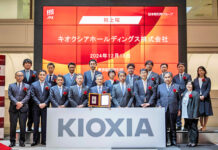Market observers in Korea express scepticism towards the impact of Japan’s bid to boost industry and the chip production goal on South Korean chipmakers
SEOUL (ANN/THE KOREA HERALD) – In the 1980s, Japan was the dominant supplier of semiconductors, accounting for more than half of the global market. In a bid to regain its former glory, the Land of the Rising Sun is offering state subsidies and setting ambitious goals for mass-producing cutting-edge chips.
The global semiconductor industry is currently experiencing significant geopolitical shifts, primarily driven by the intense rivalry between the US and China. In this competitive landscape, all eyes are on Japan to see if it can secure a meaningful share in the market.
The Japanese government has committed to investing billions of dollars to bolster its domestic chip industry. Additionally, they are actively seeking to attract major global chip giants like Taiwan Semiconductor Manufacturing Co. and Samsung to establish a presence on Japanese soil.

In June 2021, soon after it succeeded in attracting TSMC to build its first semiconductor fab on its soil in Kumamoto prefecture with hefty subsidies, the Japanese government announced its support plan worth JPY2 trillion yen to boost its domestic semiconductors industry.
As Japan’s chips industry now holds about a 10 per cent share in the global chips market, the country also set the goal to increase its chip sales to JPY15 trillion by 2030.
For the goal to increase chip production on its soil, Japan is now offering subsidies for companies that are to launch either production fabs or research and development institutes, including TSMC, Samsung and Micron Technology.
Japan’s ambitions do not stop there. In 2022, the Japanese government not only forged a chip partnership with the US, but also orchestrated the establishment of Rapidus, a memory chip firm, gathering support from eight major companies in different fields: Denso, Kioxia, MUFG Bank, NEC, NTT, SoftBank, Sony and Toyota.
As of now, Japan’s Ministry of Economy, Trade and Industry has officially offered JPY330 billion of support for the company’s goal to begin mass production of cutting-edge 2-nanometer semiconductors in 2027.
On the diplomatic front, Japan also took the bold step to ban exports of 23 types of key equipment necessary in producing advanced chips to China, even as it was the top exporter of the products for China. The move shows the country’s commitment to align its trade policy with the US, which is intent to contain China’s clout in the global chip market.
Goal ‘too ambitious’?
Market watchers are largely skeptical on the possible impact of Japan’s industry boost plan and the chip production goal on Korean chipmakers
While Japan is undoubtedly a dominant player in the global chip materials market, it does not guarantee that the country will be able catch up with rivals such as Samsung and TSMC, which are thought to be 10 years ahead in production and technology.
“It will be a difficult match if Rapidus is able to produce the 2nm chips, as Samsung and TSMC would have to share the market portion they are expected to secure. But doing well producing the parts used in chips and the equipment does not mean they can do well in making a complete product,” an industry official told The Korea Herald under the condition of anonymity.
For Rapidus that is expected to directly compete with Samsung and TSMC, the goal to produce the 2nm chip appears to be “quite extreme” considering how Japan’s latest logic semiconductor production is as advanced as 40nm nodes.
Major chip foundries like TSMC and Samsung have yet to enter mass production of the 2nm chips, while both of them also target to achieve the goal at an earlier time of 2025.
Rapidus’ strategy strongly relies on the partnership it forged with IBM, the US-based logic chip producer that developed the market’s first 2nm technology in 2021. Rapidus will be “learning” from IBM to produce the chips for IBM, the company has said.
Rapidus President and CEO Atsuyoshi Koike has said the company has already kicked off talks on supplying the advanced chips to some of the largest US tech companies.
Another industry official here, however, said it is in question how Rapidus’ collective leadership, with companies in the different areas jointly supporting the entity, would play out to help the company make decisions in business.
“It is also hard to find a case in the chip industry where such a joint entity survived to acquire a meaningful market share, and it may be because having an independent structure for decision-making is crucial to do well in this industry.”
Experts also point out that it is not the first time Japan made such a joint corporation gathering key companies in an attempt to revive the chips industry, only to fail.
In 1999, Hitachi and NEC, leading chipmakers in Japan at the time, established Elpida Memory, and later took over Mitsubishi Electric. Elpida actually managed to grasp the third largest market share at one time, but the company went bankrupt in 2012 and ended up being sold to the US rival Micron Technology.
In addition, Rapidus would have to secure some JPY5 trillion over the decade to mass produce the cutting-edge chip, which is way above the JPY330 billion the Japanese government is offering.
Despite the limitations, Japan’s commitment to revive its chip industry is clear.
Japan still managed to attract the top chipmakers to either invest or build facilities in Japan, in all areas — TSMC in foundry, Micron in Dram, TSMC, Samsung and Intel in post-processing and packaging. The country also has Kioxia, which is the third biggest memory chip maker in the world, and Renesas Electronics specialized in automotive chips which is a newly growing market.
Experts here say South Korea should also boost its weak areas, such as logic chip production, and focus on fostering skilled talents to make sure it is not caught by Japan’s chase in the long-term.
“Japan is taking advantage of the rising economic protectionism. The US which once tried to contain Japan’s clout in the global chip market is now fully backing Japan since South Korea and Taiwan carry geopolitical risks,” Kim Yang-hee, a professor of economics at Daegu University, wrote in her column.



















































